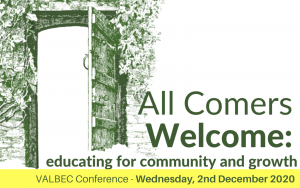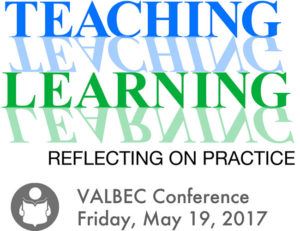Conferences
2025 Conference

 ACAL and VALBEC have joined forces to bring you Inclusion, Empowerment, Employment: Literacies for a dynamic future, our 2025 conference to be held on September 4 and 5.
ACAL and VALBEC have joined forces to bring you Inclusion, Empowerment, Employment: Literacies for a dynamic future, our 2025 conference to be held on September 4 and 5.
Explore the role of literacy in empowering adults, fostering inclusion, and increasing wellbeing in a range of contexts – personal, community, study and work.
Explore the website and consider submitting an application to present: https://acal.edu.au/wp/25conf-home/
We are looking forward to seeing you there!
2024 Conference

Welcome to VALBEC’s 2024 conference titled: Supportive practices in a transformative landscape. In the ever-changing landscape of education, transformative learning stands out as an imperative part of what we do as educators. Now, more than ever, it's crucial to refocus our efforts on students and practices that foster deep engagement and meaningful connections with communities and industry.
 Keynote speaker: Professor Vicky Duckworth has developed a national and international reputation for research in Adult Education and Literacy. Vicky is deeply committed to challenging inequality through critical and emancipatory approaches to education, widening participation, inclusion, and community action. A key strand of work includes addressing the personal/public and intergeneration impact of trauma and violence on learners lives and their communities. Alongside Rob Smith, Vicky led the ground-breaking Transforming Lives project (Smith and Duckworth, 2022) which exposed the benefits of education throughout life. Vicky was a member of the 2019 Lifelong Learning Commission and is a founder member of Right2Learn.
Keynote speaker: Professor Vicky Duckworth has developed a national and international reputation for research in Adult Education and Literacy. Vicky is deeply committed to challenging inequality through critical and emancipatory approaches to education, widening participation, inclusion, and community action. A key strand of work includes addressing the personal/public and intergeneration impact of trauma and violence on learners lives and their communities. Alongside Rob Smith, Vicky led the ground-breaking Transforming Lives project (Smith and Duckworth, 2022) which exposed the benefits of education throughout life. Vicky was a member of the 2019 Lifelong Learning Commission and is a founder member of Right2Learn.
There are three focus areas for presentations: ‘Responsive Practices’, ‘Community Engagement’, and ‘Empowering Learners’. which promise to create an amazing array of presentations.
View the conference program and handouts.
2023 Conference

Welcome to VALBEC’s 2023 conference titled:
REFOCUS: Learner Centred Practice. For this conference we are excited to showcase all of the exciting things that are done in our educational spaces. With the COVID pandemic impacting so greatly, there is no better time than now to start re-focussing on our students and the practices that help us engage and connect with them.There are three focus areas for presentations: ‘Classroom Practices’, Programs of Innovation’ and ‘Workplace Connections’ which promise to create an amazing array of spaces for us all to learn from.
View the conference booklet.
View the conference program.
Connection is at the core of what we do, and it's something we want to talk about more. We invite you to consider what connection means for you, and what reconnecting to learners could mean in the future.
Come ready to discuss this and other aspects of your practices, and share your stories as we move toward a brand new era of adult education.
View photos from the conference
2021 Conference
Organising a conference in the current climate presents new challenges as we transition from lockdowns to opening ups. This year we need to be inspired more than ever and we encourage potential presenters to share your successes with us all.
Our conference will be online again but with a little difference – we will run it over two days. However, we won’t have the possibility to attend face-to-face at Angliss Conference Centre unfortunately. Nevertheless we look forward to meeting you 25-26 November 2021.
Presenters will be able to attend the Conference for free. Stand by for announcements in the coming weeks on conference charges.

2020 VALBEC Conference
What was intended for the conference in May needs some adjusting for the conference in December. What an incredible time we’re having! And it may well stay incredible well into the new year. By then we’ll be seasoned explorers of virtual pedagogy, and experts in engaging tired and stressed students.
In 2020 we would like practitioners to tell us about their journey in these unprecedented times.
2019 VALBEC Conference

The 2019 theme – Resilience: connect, educate, empower – invited us to celebrate and explore how teachers and students achieve in education.
- Connect – with colleagues, community and students to succeed in a new skill, or lay down the foundations for something new
- Educate – by the development and delivery of good learning experiences for students or staff.
- Empower – demonstrate how learning has enabled students or colleagues to utilise their resilience to achieve their goals.
2018 VALBEC Conference

Workplaces are said to be in the middle of a ‘fourth industrial revolution’, following the earlier transformations brought about by steam, electricity and digitisation. It is often referred to simply as ‘Industry 4.0’. The emerging ‘smart’ factories in Industry 4.0 increasingly rely upon automation augmented by artificial intelligence, the crowdsourcing of tasks, and the use of freelance workers engaged in micro-tasking.










